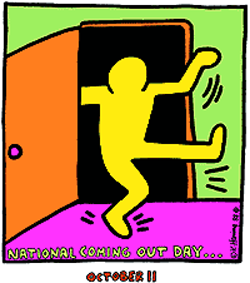Mark Foley, and “real” gay relationships
In an opinion piece for the LA Times, Michelangelo Signorile says that the media should have “outed” Mark Foley as gay soon after his hypocritcal votes in favor of anti-gay legislation. I agree with Signorile about “outing” hypocritical public figures, and always have. But there’s something else in the article that I wanted to highlight…
Foley lived in a glass closet in Washington, where many people, we’re now being told, assumed he was gay, even as he orchestrated a lie for the voters of his district with help from the media both in Washington and at home in Florida.
Foley’s closet wasn’t just about protecting his political career. He seemed to be filled with shame. According to one gay man quoted in the Washington Post last week who challenged Foley on his voting for the Defense of Marriage Act in 1996, Foley justified marginalizing gay marriage by saying, “I could never compare any relationship I have ever had to the nature of my mother and father’s relationship.”
For Foley, homosexuality meant second-class status.
That kind of self-loathing is bound to play out in harmful ways. Would Foley have made online sexual advances on teenagers if he were openly gay or if he’d been reported on, truthfully, by the media as a gay man long ago, and faced the consequences? It’s quite possible the answer is no.
I find the phrase I highlighted above just heartbreaking, for Mark Foley’s sake as well as for my own.
I love my parents, and the people who are especially my role models for a good marriage — my paternal grandparents, who are just wonderful people. But do they somehow have a more “valid” relationship than mine? Of course not. When I see my girlfriend, I see someone as important to me as the members of my own family; someone that I love, adore, want to become a better person for, to live with and build a life with.
If I can live up to my grandparent’s example even half way (I’ve referred to them in the past as living examples of “happily ever after”) then I will be more successful as a spouse than 95% of heterosexual married couples are. And I love Stephanie so much that I want that for her and for me. I want a relationship like my grandparents have, with love and stability, surrounded by family and friends.
As loathsome as I think Mark Foley’s behavior was, I hope that someday he finds a relationship that moves him in that way, too — an equitable relationship based on respect and honesty and concern for the well being of his partner, and not taking advantage of people over whom he has power.
